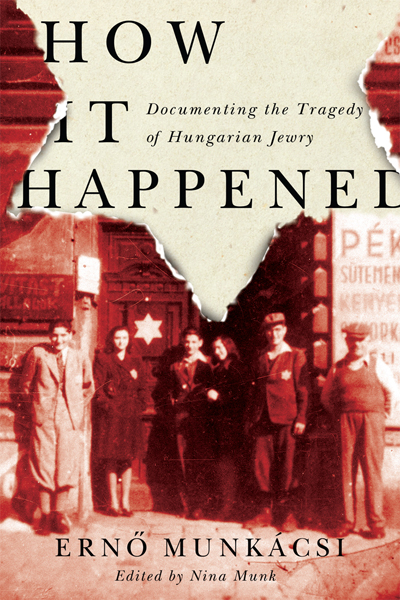Search Results: Returned 2 Results, Displaying Titles 1 - 2
-
-
2018., McGill-Queen's University Press Call No: 943.9004924 M966h Availability:1 of 1 At Your Library Summary Note: "A gripping first-hand account of the devastating 'last chapter' of the Holocaust, written by a privileged eyewitness, secretary of the Hungarian Judenrat, and a member of Budapest's Jewish elite, How It Happened is a unique testament to the senseless brutality that, in a matter of months, decimated what was Europe's largest and last-surviving Jewish community. Writing immediately after the war and examining only those critical months of 1944 when Hitler's Germany occupied Hungary, Erno Munkácsi describes the Judenrat's desperation and fear as it attempted to prevent the looming catastrophe, agonized over decisions not made, and struggled to grasp the immensity of a tragedy that would take the lives of 427,000 Hungarian Jews in the very last year of the Second World War. This long-overdue translation makes available Munkácsi's profound and unparalleled insight into the Holocaust in Hungary, revealing the 'choiceless choices' that confronted members of the Judenrat as they were forced to execute the Nazi's orders. With an in-depth introduction, a brief biography of Erno Munkácsi, ample annotations by László Csosz and Ferenc Laczó, two dozen archival photographs, and detailed maps, How It Happened is an essential resource for historians and students of the Holocaust, the Second World War, and Central Europe."--.
-
-
By Munk, Nina2013., Adult, Signal Call No: 339.46 M966i Availability:1 of 1 At Your Library Summary Note: "'The poor you will always have with you,' to cite the Gospel of Matthew 26:11. Jeffrey Sachs--celebrated economist, special advisor to the Secretary General of the United Nations, and author of the influential bestseller "The End of Poverty"--disagrees. In his view, poverty is a problem that can be solved. With single-minded determination he has attempted to put into practice his theories about ending extreme poverty, to prove that the world's most destitute people can be lifted onto 'the ladder of development.' In 2006, Sachs launched the Millennium Villages Project, a daring five-year experiment designed to test his theories in Africa. The first Millennium village was in Sauri, a remote cluster of farming communities in western Kenya. The initial results were encouraging. With his first taste of success, and backed by one hundred twenty million dollars from George Soros and other likeminded donors, Sachs rolled out a dozen model villages in ten sub-Saharan countries. Once his approach was validated it would be scaled up across the entire continent. At least that was the idea. For the past six years, Nina Munk has reported deeply on the Millennium Villages Project, accompanying Sachs on his official trips to Africa and listening in on conversations with heads-of-state, humanitarian organizations, rival economists, and development experts. She has immersed herself in the lives of people in two Millennium villages: Ruhiira, in southwest Uganda, and Dertu, in the arid borderland between Kenya and Somalia. Accepting the hospitality of camel herders and small-hold farmers, and witnessing their struggle to survive, Munk came to understand the real-life issues that challenge Sachs's formula for ending global poverty. The Idealist is the profound and moving story of what happens when the abstract theories of a brilliant, driven man meet the reality of human life."--Jacket.






